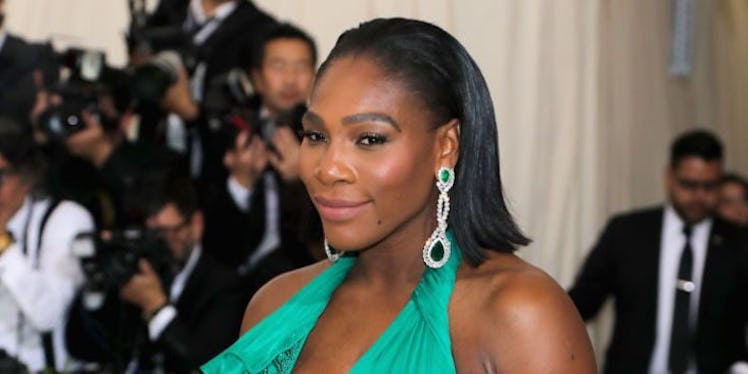
Serena Williams Shared How She Fights The Wage Gap For #BlackWomensEqualPayDay
Serena Williams is a force on and off of the tennis court, and she's making it known with her latest statements about the wage gap. For Black Women's Equal Pay Day, Serena Williams shared an essay with Fortune magazine about not just her hopes for change as it pertains to black women and their income status, but also how she plans to go about making sure it happens. The tennis star shared some pretty sobering statistics about the disparities black women face in the workplace.
Williams first addressed her own experience with racism as a working woman.
She wrote,
Growing up, I was told I couldn't accomplish my dreams because I was a woman and, more so, because of the color of my skin. In every stage of my life, I've had to learn to stand up for myself and speak out. I have been treated unfairly, I've been disrespected by my male colleagues and—in the most painful times—I've been the subject of racist remarks on and off the tennis court. Luckily, I am blessed with an inner drive and a support system of family and friends that encourage me to move forward. But these injustices still hurt.
Her statements highlight the fact that wage discrimination is just one part of a huge problem in the workforce when it comes to the treatment of black women.
Williams acknowledged her significant financial success and that the other "24 million black women" in the United States have a greater burden. Having to deal with microaggressions and blatant racism at work is undoubtedly extra stressful when you take home a paycheck that also reflects how much your company values you as a black woman.
Black women, who are currently the most educated group in America, according to the Independent, make only 67 cents to every dollar made by a white man.
Williams acknowledged these women in her essay, writing,
The cycles of poverty, discrimination, and sexism are much, much harder to break than the record for Grand Slam titles. For every black woman that rises through the ranks to a position of power, there are too many others who are still struggling. Most black women across our country do not have the same support that I did, and so they often don't speak out about what is just, fair and appropriate in the workplace. When they do, they are often punished for it. Unfair pay has prevailed for far too long with no consequence. Through decades of systematic oppression, black women have been conditioned to think they are less than. In many cases, these women are the heads of households. Single mothers. The issue isn't just that black women hold lower-paying jobs. They earn less even in fields of technology, finance, entertainment, law, and medicine.
Williams, who joined SurveyMonkey's board of directors in May, worked to conduct a survey on the attitudes people have towards this wage gap.
Some findings from the study include the fact that 69 percent of black women perceive a pay gap, while just 44 percent of men recognize the issue. In addition to gender, black women see obstacles to racial equality: three-quarters of black women workers say there are still significant hurdles holding back minorities.
Still, some black women remain optimistic: more than 43 percent of black millennial women believe men and women have equal opportunities for promotion.
The most alarming stat on this list is that only 44 percent of white men recognize the issue. As Williams wrote, "the first step in making a change is recognition."
Luckily, people like Williams and other prominent women are using their voices and platforms. Senator Kamala Harris has even presented an action plan for taking this wage gap fight to the next level, which starts with pay transparency on the job.
One of the hardest things about navigating this racialized pay gap as a black woman is that while statistics exist, it's hard to know exactly how to go about claiming justice when you don't always know what your colleagues are making. Harris has co-sponsored a bill called the Paycheck Fairness act to address this issue.
She wrote in an article for Bustle,
[The act] requires employers to show that pay differences are not due to gender, and cracks down on employers who break the rules or punish employees who seek to be paid equally.
Here's to hoping that we increase recognition for the wage gap and see some sure-fire solutions for closing it ASAP.